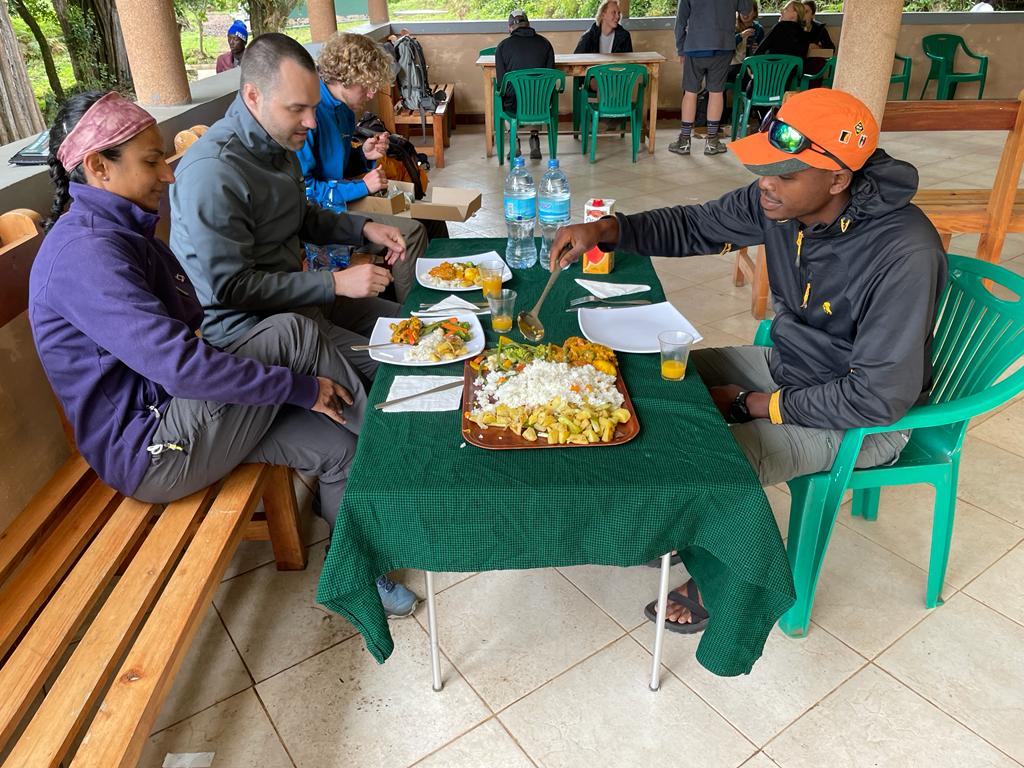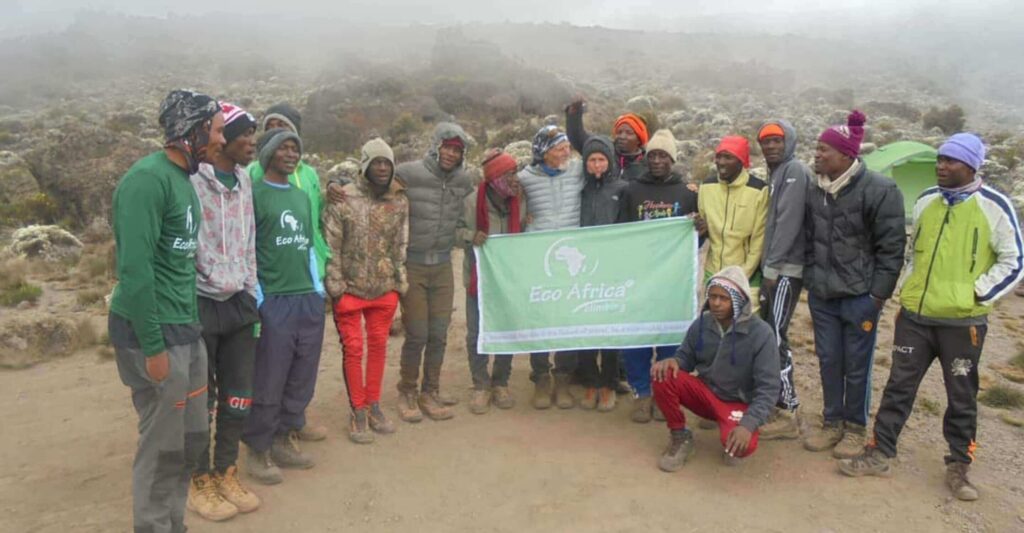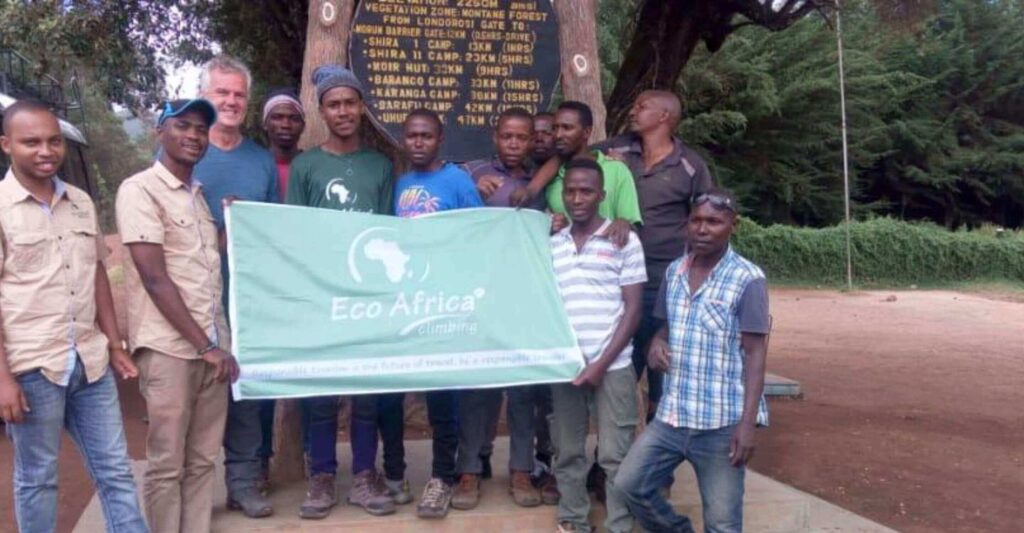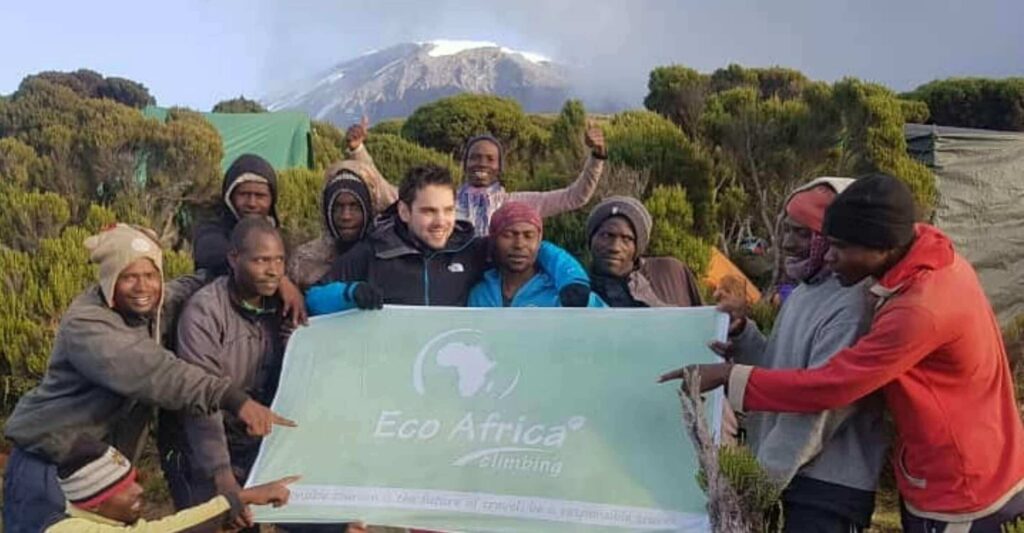FOOD ON MOUNTAIN KILIMANJARO

What Food will be provided on Mountain Kilimanjaro?
Great menus… Fueling you to the top of Africa!
You will be amazed at the variety, quality & quantity of the food we serve while you are on your Mount Kilimanjaro climb.
As you are trekking for between 6-9 hours a day (before summit night), you will be burning many calories – and as you are at altitude – even more than you would at sea level.
Our Mountain crew always makes sure that you are well fed and fully fuelled for climbing Kilimanjaro is paramount – so you’ve enough energy to get to the top. On all of our, Kilimanjaro climbs, you will be fully supported by a team of guides, cooks, and waiters who will cater to every dietary requirement and have three hot cooked meals a day – plus a plentiful supply of water and hot drinks.
Our experienced cooks take great pride in serving delicious and nutritional meals. Our menus have been precisely planned to provide you with the necessary energy and nutrients and keep you hydrated. We even have a resupply crew mid-way through your trek to ensure everything is fresh just for you.
Below is a sample of our menu during the climb.
Breakfast: Fruit juice and fruit, cereal, porridge, eggs prepared at request, slices of bread and toast with jam margarine and honey, French toast, pancakes, sausage, bacon, teas, coffee, drinking chocolate.
Snacks: peanuts, crisp, popcorn, cookies, chocolate, dried fruits
Lunch: Sliced vegetables, fruit, boiled egg, meat cutlets, various sandwiches options (egg/ cheese/tomato/tuna/meat/peanut butter), macaroni and meat sauce, and slices of bread.
Dinner: soup of the day, slices of bread, salads, rice, pasta, potatoes, roast or fried chicken, beef or fish, curries, mixed vegetables, lentils, fruit salad, fruit with custard, teas, coffee, drinking chocolate.
Summit night, we offer a midnight snack with juice, soup, hot chocolate, tea or coffee, and biscuits. When you return to base camp, a nice meal will be waiting for you to reward all your hard work.
We also consider your choice of food that you would prefer -Vegetarian, Vegan, Kosher, and Non-Vegetarian)
We are happy to accommodate any dietary restrictions or requests.
There is a space to indicate what you don’t eat and what you eat in our booking form.
Therefore we ask all our climbers to be free to tell us what they eat and what they don’t eat.
In the case of very strict diets, we recommend you bring along some of your favorite “energy” foods, as some specialty ingredients can be hard to source in Tanzania.
One overall effect of altitude is a reduced appetite. We offer enticing meals rich in “good” carbohydrates. According to the US Army Research Institute of Environmental Medicine, “carbohydrate is the most efficient fuel for optimizing performance at altitude”, speeding up recovery and replenishing muscle glycogen stores for the next day’s activity.
The same study says, “a high carbohydrate diet at altitude is recommended as an intervention to alleviate symptoms of AMS (acute mountain sickness)” as it increases ventilation and blood oxygenation.
With the decreased appetite, carbohydrate-based foods are often more palatable than high protein or fats, and altitude changes your metabolic processes. The combination of hours on the trail and your body’s adaptation to altitude means you’ll have a much higher energy requirement than at home.
Experienced climbers who are used to eating horrible dehydrated foods on the trail are often surprised at the quality and variety of food from our mountain kitchens. We use only fresh produce, no dehydrated “ready meals,” and our porters carry all food up Mount Kilimanjaro.
All our meals are served inside the mess tents for dining for whatever the weather or temperature on Kilimanjaro; there will be cover and shelter to enjoy each meal.
The mess tents will always be up when you come into the camp. If the weather is especially nice, we will set up dining tables and chairs outside to make the most of the views. Our mess tents and Kilimanjaro camping equipment are of the highest quality and will therefore always be warm, dry, and a spacious area to relax in.
Fueling Your Kilimanjaro Trek: Understanding Carbohydrate Requirements for High Altitude Hiking
On the mountain, meals primarily consist of rice, potatoes, and pasta with fresh fruits and vegetables served alongside. While meat is available, it is not provided in large quantities due to its difficulty in digesting at high altitudes and its limited shelf life on the mountain. To ensure that the team has access to fresh food throughout the climb, we regularly restock our supplies.
Consuming a diet high in carbohydrates is widely recognized as being beneficial for enhancing endurance. Carbohydrates play a crucial role in replenishing depleted muscle glycogen, preventing muscle breakdown, and requiring less oxygen for metabolism. This effect is particularly significant at high elevations.
At higher elevations, the body’s primary energy source shifts from fat to carbohydrates due to the lower oxygen levels. Carbohydrates require 8-10% less oxygen for metabolism than fats or proteins, which may explain why individuals tend to increase their carbohydrate intake naturally in response to the reduced oxygen availability.
It’s important to note that protein and fat are not well-tolerated at high altitudes, and their absorption rates drop significantly. Therefore, it’s recommended that you reduce your intake of these nutrients accordingly.
To maintain optimal performance at high altitude, it’s crucial to consume a predominantly carbohydrate-based diet. It’s suggested that at least 60% of your calorie intake should come from carbohydrates at high altitude. This is why our menu consists mainly of high-carbohydrate meals that are designed to sustain your body’s energy levels during your climb.
Carbohydrates not only provide the ideal source of energy for climbing but are also crucial for altitude acclimatization. Consuming a high-carbohydrate diet has been shown to alleviate symptoms of acute mountain sickness (AMS). Studies have demonstrated that increasing carbohydrate intake can mitigate the effects of altitude by up to 1,000 feet at a height of 13,000 feet and 2,000 feet at a height of 17,000 feet.
Fueling Your High-Altitude Adventure: Essential Tips for Eating at Altitude
At higher altitudes, many individuals experience appetite loss and nausea, which can make eating a challenge. Despite these obstacles, it’s crucial to make a conscious effort to eat regularly and avoid falling into a calorie deficit. Doing so can hamper your acclimatization, recovery, and athletic performance on the mountain. If necessary, prioritize consuming any food available, even if it’s not your preferred choice. It’s important to remember that protein, fat, and carbohydrates all provide valuable sources of calories.
It’s highly recommended that you bring along some snacks to supplement your diet during your climb up the mountain. Not only do they offer a valuable source of additional calories, but they can also help break up the monotony of your regular meals and provide a much-needed morale boost during challenging times.
Here are some essential tips to keep in mind when it comes to eating during your Kilimanjaro expedition:
- Be sure to wash your hands thoroughly before every meal.
- Avoid skipping meals, even if you don’t feel particularly hungry.
- Stick to the high-carbohydrate diet that we will provide.
- Consider bringing along some of your favorite snacks from home.
- Drink a minimum of four liters of water per day.
- Don’t forget to take electrolytes to help maintain proper hydration levels.
- Avoid consuming alcohol, tobacco, or any depressant drugs, including barbiturates, tranquilizers, sleeping pills, and opiates.
- Limit your caffeine intake to avoid overstimulation.
Our Top Recommended Ethical Kilimanjaro Climbs
Ethical Kilimanjaro via Northern Circuit Route 9 Days
The Northern Circuit route is one of the best routes on Kilimanjaro.The route approaches Mount Kilimanjaro from the west….
From USD $3250
Ethical Kilimanjaro via Lemosho Route 8 Days
The Lemosho route is one of the newer routes on the mountain and a superb choice for your climb, It is our preferred route…
From USD $2950
Ethical Kilimanjaro via Machame Route 7 Days
Machame (“Whiskey”) Route is also known as the “Whiskey” route, the Machame route is now the most popular route on the …
From USD $2650


